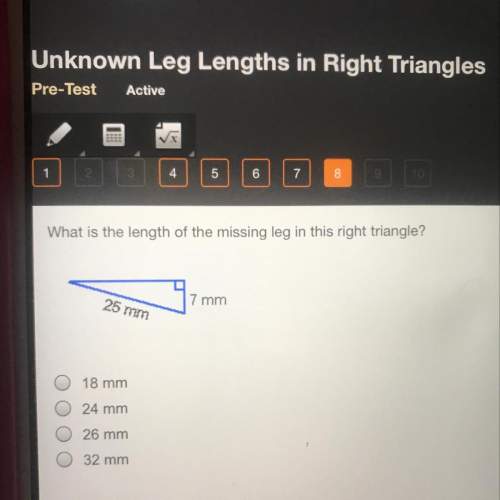
Mathematics, 25.07.2019 15:00 HighSchool97654
Fx + y is rational, must x and y each be rational? a) yes; because the sum of rationals is rational. b) no; because the sum of irrationals is always irrational. c) no; because x and y could be additive inverses of each other. d) yes; because x and y must be integers, and integers are rational.

Answers: 1


Another question on Mathematics

Mathematics, 21.06.2019 17:20
Which system of linear inequalities is represented by the graph? + l tv x-3y > 6 and y > 2x o x + 3y > 6 and y o x-3y > 6 and y> 2x o x + 3y > 6 and y > 2x + 4 la +
Answers: 1

Mathematics, 21.06.2019 19:30
Identify the number 127 as a rational or irrational. explain
Answers: 2

Mathematics, 21.06.2019 23:40
For a science project, a high school research team conducted a survey of local air temperatures. based on the results of the survey, the found that the average temperatures were around 10 degrees higher than expected. this result was wrong. the trouble with the survey was that most of the locations were exposed to direct sunlight and located over asphalt or sand, which resulted in higher temperatures than normal. this is a classic example of an error in which phase of inferential statistics?
Answers: 1

Mathematics, 22.06.2019 04:00
Which function has an inverse that is also a function? a. g(x) = 2x-3 b. k(x) = -9x2 c. f(x) |x+2| d. w(x) = -20
Answers: 1
You know the right answer?
Fx + y is rational, must x and y each be rational? a) yes; because the sum of rationals is rationa...
Questions



Biology, 15.11.2019 03:31


Mathematics, 15.11.2019 03:31


Mathematics, 15.11.2019 03:31

Health, 15.11.2019 03:31

Mathematics, 15.11.2019 03:31

History, 15.11.2019 03:31


Mathematics, 15.11.2019 03:31





English, 15.11.2019 03:31

Mathematics, 15.11.2019 03:31


Spanish, 15.11.2019 03:31




